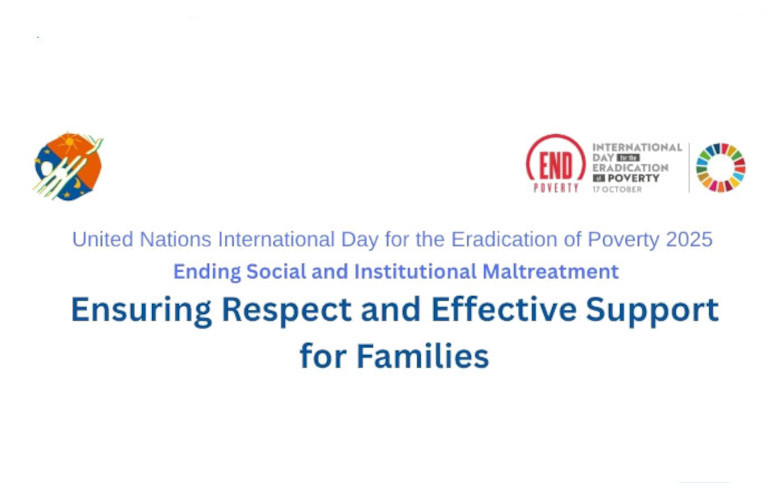Messages from United Nation Partners

Messages for the International Day for the Eradication of Poverty 2025 event at the United Nation in New York
![]() Reading time 5 minutes
Reading time 5 minutes
Event theme: “Ensuring respect and effective support for families,” under the umbrella theme of “Ending social and institutional maltreatment.”
THE SECRETARY-GENERAL
—
MESSAGE FOR INTERNATIONAL DAY FOR THE ERADICATION OF POVERTY
17 October 2025
Too often, people living in poverty are blamed, stigmatised, and pushed into the shadows.
Yet poverty is not a personal failure; it is a systemic failure – a denial of dignity and human rights.
This year’s International Day for the Eradication of Poverty calls on us all to stop the social and institutional maltreatment of people living in poverty – and to honour the promise of the Sustainable Development Goals to eradicate poverty in all its forms, everywhere.
That requires policies that leave no one behind: affordable health care and housing; decent work and fair wages; universal social protection; food security; quality education; and financing that works for countries and communities.
On this International Day for the Eradication of Poverty, let’s reject stigma and discrimination. Let’s stand with people living in poverty, and act with solidarity to end poverty for good.
UNICEF
For UNICEF, “ensuring respect and effective support for families” means empowering families to fulfill the vital role of caregiving while upholding the dignity, rights and voices of all family members.
Effective support is about providing families with the resources, services and opportunities they need for their children’s well-being, development and protection. Central to this is social protection. UNICEF advocates for inclusive, child-sensitive social protection systems. This includes cash transfers and parental support systems, including paid parental leave and accessible and quality childcare for children and families in poverty.
However, to truly ensure respect, support must go beyond access: it must be “shame-proof”. This means services must be designed and delivered in ways that uphold dignity, avoid stigma and prevent families from feeling judged or blamed for their circumstances.
UNICEF and its partners help create the conditions for every child to be free from poverty and to realize their full potential.
Baha’i International Community
For the worldwide Bahá’í community, fostering new patterns of family life suited to humanity’s ongoing advancement is essential to the flourishing of individuals, communities, and entire societies. “A family is a nation in miniature,” state the Bahá’í holy writings. It is one of the basic building blocks of entire social orders. While families have historically assumed a wide range of characteristics across diverse settings, often in response to the exigencies of various times, outdated arrangements and definitions are now reaching their limits. Rigid kinship ties, for instance, may have once promoted advancement, but could hinder social cohesion in an increasingly interconnected world.
Family is where individuals often first form relationships and begin to learn how to interact with others. It is where qualities and conditions of love, care, trust, and solidarity are initially nurtured and ultimately woven into the fabric of broader society. Guided by this vision Bahá’ís are learning, alongside neighbors and friends, to strengthen family life and cultivate vibrant families that contribute to societal transformation. Through such efforts, families are supported to ensure the intellectual and spiritual education of children, nurturing their talents and capacities to lead purposeful lives of service. Through educational processes that focus on principles such as unity and equality among family members, outdated gender roles have in many instances given way to more equal bonds of mutual care. Supporting families ultimately involves efforts to reexamine societal norms and establish new patterns of family life that foster safety and belonging and meet humanity’s ongoing development.
Global Coalition for Social Protection Floors
Ensuring effective and respectful social protection for families
Families and individuals experiencing poverty often face challenges that go beyond material deprivation. These difficulties are multidimensional, involving social and institutional disadvantages, and are frequently intensified by systemic discrimination and exclusion. To effectively address poverty, policies must adopt a comprehensive approach that reflects a deep and context-specific understanding of the various forms of deprivation and discrimination people experience. It is essential that these policies are developed with the direct participation of those affected by poverty, ensuring their perspectives and voices are incorporated throughout the process.
Social protection coverage is one important way to support families and people living in poverty. However, four billion people have no social protection coverage. This astonishing fact means that they lack critical means of escaping poverty, or of avoiding falling into poverty, and do not enjoy food security for their families and themselves, nor have access to essential health and other services. Over the past 13 years our Global Coalition for Social Protection Floors (GCSPF) has been active to support the extension of social protection coverage, in line with ILO Recommendation No. 202 on social protection floors.
While the provision of social protection is crucial, the manner in which it is administered is equally important. Policies must be responsive to the priorities and circumstances of people and families living in poverty. The participation of the right holders—those who are entitled to social protection—is essential in ensuring that these policies are not only effective but also administered with respect and dignity.
AZ-WvG/14.9.2025

